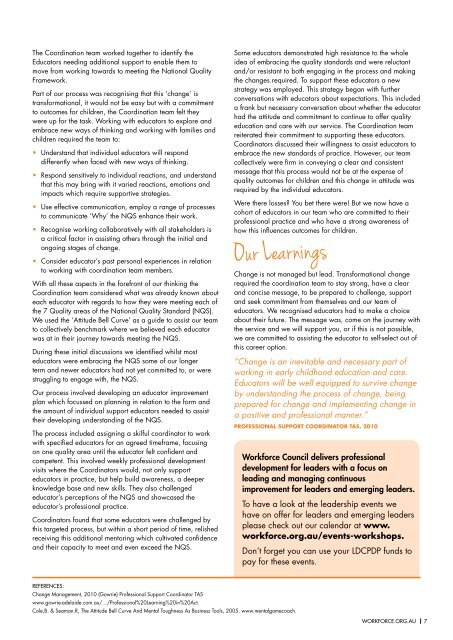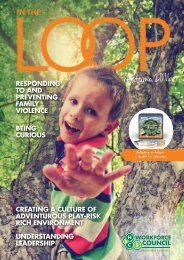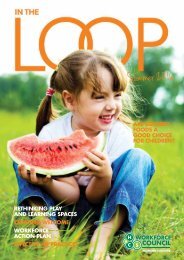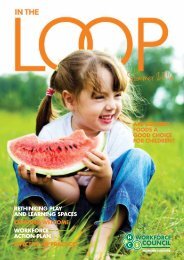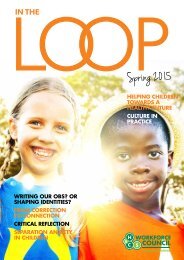Summer 2015
Create successful ePaper yourself
Turn your PDF publications into a flip-book with our unique Google optimized e-Paper software.
The Coordination team worked together to identify the<br />
Educators needing additional support to enable them to<br />
move from working towards to meeting the National Quality<br />
Framework.<br />
Part of our process was recognising that this ‘change’ is<br />
transformational, it would not be easy but with a commitment<br />
to outcomes for children, the Coordination team felt they<br />
were up for the task. Working with educators to explore and<br />
embrace new ways of thinking and working with families and<br />
children required the team to:<br />
• Understand that individual educators will respond<br />
differently when faced with new ways of thinking.<br />
• Respond sensitively to individual reactions, and understand<br />
that this may bring with it varied reactions, emotions and<br />
impacts which require supportive strategies.<br />
• Use effective communication, employ a range of processes<br />
to communicate ‘Why’ the NQS enhance their work.<br />
• Recognise working collaboratively with all stakeholders is<br />
a critical factor in assisting others through the initial and<br />
ongoing stages of change.<br />
• Consider educator’s past personal experiences in relation<br />
to working with coordination team members.<br />
With all these aspects in the forefront of our thinking the<br />
Coordination team considered what was already known about<br />
each educator with regards to how they were meeting each of<br />
the 7 Quality areas of the National Quality Standard (NQS).<br />
We used the ‘Attitude Bell Curve’ as a guide to assist our team<br />
to collectively benchmark where we believed each educator<br />
was at in their journey towards meeting the NQS.<br />
During these initial discussions we identified whilst most<br />
educators were embracing the NQS some of our longer<br />
term and newer educators had not yet committed to, or were<br />
struggling to engage with, the NQS.<br />
Our process involved developing an educator improvement<br />
plan which focussed on planning in relation to the form and<br />
the amount of individual support educators needed to assist<br />
their developing understanding of the NQS.<br />
The process included assigning a skilful coordinator to work<br />
with specified educators for an agreed timeframe, focusing<br />
on one quality area until the educator felt confident and<br />
competent. This involved weekly professional development<br />
visits where the Coordinators would, not only support<br />
educators in practice, but help build awareness, a deeper<br />
knowledge base and new skills. They also challenged<br />
educator’s perceptions of the NQS and showcased the<br />
educator’s professional practice.<br />
Coordinators found that some educators were challenged by<br />
this targeted process, but within a short period of time, relished<br />
receiving this additional mentoring which cultivated confidence<br />
and their capacity to meet and even exceed the NQS.<br />
Some educators demonstrated high resistance to the whole<br />
idea of embracing the quality standards and were reluctant<br />
and/or resistant to both engaging in the process and making<br />
the changes required. To support these educators a new<br />
strategy was employed. This strategy began with further<br />
conversations with educators about expectations. This included<br />
a frank but necessary conversation about whether the educator<br />
had the attitude and commitment to continue to offer quality<br />
education and care with our service. The Coordination team<br />
reiterated their commitment to supporting these educators.<br />
Coordinators discussed their willingness to assist educators to<br />
embrace the new standards of practice. However, our team<br />
collectively were firm in conveying a clear and consistent<br />
message that this process would not be at the expense of<br />
quality outcomes for children and this change in attitude was<br />
required by the individual educators.<br />
Were there losses? You bet there were! But we now have a<br />
cohort of educators in our team who are committed to their<br />
professional practice and who have a strong awareness of<br />
how this influences outcomes for children.<br />
Our Learnings<br />
Change is not managed but lead. Transformational change<br />
required the coordination team to stay strong, have a clear<br />
and concise message, to be prepared to challenge, support<br />
and seek commitment from themselves and our team of<br />
educators. We recognised educators had to make a choice<br />
about their future. The message was, come on the journey with<br />
the service and we will support you, or if this is not possible,<br />
we are committed to assisting the educator to self-select out of<br />
this career option.<br />
“Change is an inevitable and necessary part of<br />
working in early childhood education and care.<br />
Educators will be well equipped to survive change<br />
by understanding the process of change, being<br />
prepared for change and implementing change in<br />
a positive and professional manner.”<br />
PROFESSIONAL SUPPORT COORDINATOR TAS, 2010<br />
Workforce Council delivers professional<br />
development for leaders with a focus on<br />
leading and managing continuous<br />
improvement for leaders and emerging leaders.<br />
To have a look at the leadership events we<br />
have on offer for leaders and emerging leaders<br />
please check out our calendar at www.<br />
workforce.org.au/events-workshops.<br />
Don’t forget you can use your LDCPDP funds to<br />
pay for these events.<br />
REFERENCES:<br />
Change Management, 2010 (Gowrie) Professional Support Coordinator TAS<br />
www.gowrie-adelaide.com.au/.../Professional%20Learning%20in%20Act.<br />
Cole,B. & Seaman.R, The Attitude Bell Curve And Mental Toughness As Business Tools, 2005. www.mentalgamecoach.<br />
WORKFORCE.ORG.AU 7


